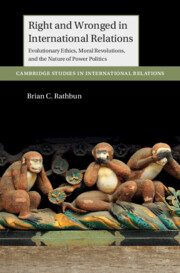 Right and Wronged in International Relations
Right and Wronged in International Relations Book contents
- Right and Wronged in International Relations
- Reviews
- Cambridge Studies in International Relations: 163
- Right and Wronged in International Relations
- Copyright page
- Dedication
- Contents
- Figures
- Tables
- Acknowledgments
- 1 The Nature in and Nature of International Relations
- 2 Lesser Angels
- 3 Mankind Is What Anarchy Makes of It
- 4 See No Evil, Speak No Evil?
- 5 To Provide and to Protect
- 6 Just Desserts in the Desert
- 7 Barking Dogs and Beating Drums
- 8 Biting the Bullet
- 9 Dying in Vain
- 10 Daily Bread
- 11 From Demonizing to Dehumanizing
- Index
- Cambridge Studies in International Relations: 163
7 - Barking Dogs and Beating Drums
Nationalism as Moral Revolution in German Foreign Policy
Published online by Cambridge University Press: 29 July 2023
- Right and Wronged in International Relations
- Reviews
- Cambridge Studies in International Relations: 163
- Right and Wronged in International Relations
- Copyright page
- Dedication
- Contents
- Figures
- Tables
- Acknowledgments
- 1 The Nature in and Nature of International Relations
- 2 Lesser Angels
- 3 Mankind Is What Anarchy Makes of It
- 4 See No Evil, Speak No Evil?
- 5 To Provide and to Protect
- 6 Just Desserts in the Desert
- 7 Barking Dogs and Beating Drums
- 8 Biting the Bullet
- 9 Dying in Vain
- 10 Daily Bread
- 11 From Demonizing to Dehumanizing
- Index
- Cambridge Studies in International Relations: 163
Summary
Explanations for Germany’s aggressive and bellicose foreign policy during the Wilhelmine period often point to efforts by entrenched elites to distract from the country’s stunted democratic development by generating international threats to unify the country. These accounts fail to come to terms with the moral revolution occurring in Germany at the time – the rise of nationalism. The identification of the group as the nation, and the understanding that the nation’s welfare is the leader’s primary concern, required a revolution in the basis of authority, one which implied that the emperor owed loyalty to the people. The nationalist right began to question the indecisive policy of the Wilhelmine regime in a way that was previously ethically sanctioned, condemning the emperor in particular for a lack of will and resolve during the second Moroccan crisis. In a dangerous world, this amounted to moral castigation. I supplement this chapter with a survey experiment conducted on the American public. For those who hold dangerous world beliefs, four virtues generally thought to indicate “competence” – disciplined and hardworking, strong-willed and determined, tough and strong, and persistent and resolute – are actually used as moral benchmarks, particularly for leaders.
- Type
- Chapter
- Information
- Right and Wronged in International RelationsEvolutionary Ethics, Moral Revolutions, and the Nature of Power Politics, pp. 198 - 231Publisher: Cambridge University PressPrint publication year: 2023
